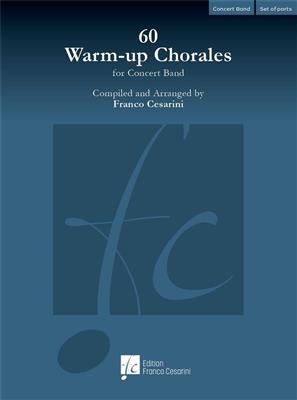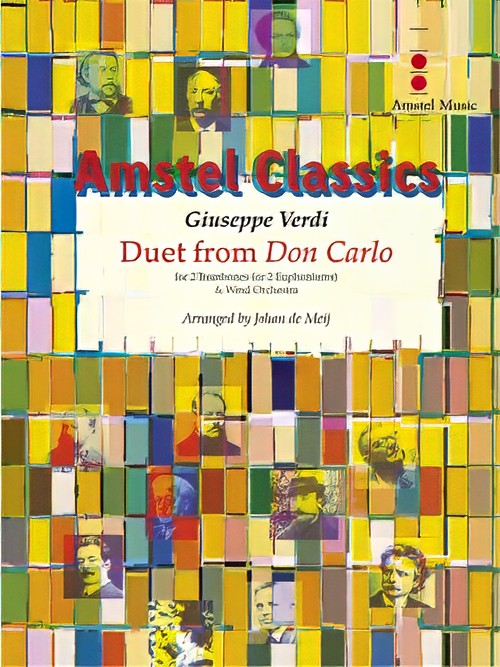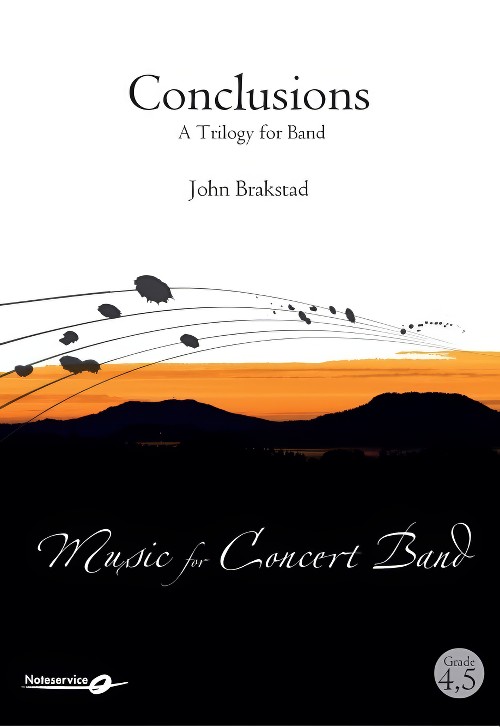Results
-
 £168.50
£168.5060 Warm-up Chorales for Concert Band
During his experience as a band conductor and teacher of wind orchestra conducting at university, Franco Cesarini has dealt with the topic of warm-ups very frequently. Throughout these long years of conducting he has had the opportunity to try many existing methods, evaluating their advantages and disadvantages.After a long time, he has decided to compile a collection of chorales for warm-ups, which are organized according to the criteria that he considers most effective.While working on his60 Warm-up Chorales for Concert Band, Franco Cesarini has always borne in mind that amateur musicians play for pleasure.He feels that it is extremely important that they have satisfaction at every moment of the rehearsal and not to start the rehearsal with needless "punishing" exercises. Nobody is really motivated to start playing with scales, long notes, or tricky rhythmical exercises. There is often a distinguished absentee in band rehearsals, namely music itself!Although this publication does not foresee a specific tempo for the chorales, they should often be performed rather slowly but without dragging.Dynamics are not indicated, so that the conductor has the opportunity to draw the attention of the musicians to his gestures and to make them react according to his indications.Timpani and bell parts have been added with the aim of not leaving the percussionists completely inactive during the warm-up phase, but can also be omitted.The chorales are written in four parts (SATB) and are also playable in smaller groups. The four voices can be played in different combinations of woodwinds or brass quartets or in mixed combinations.The collection includes ten chorales for the following keys: D flat major, A flat major, E flat major, B flat major, F major and C major.With his 60 Warm-up Chorales Franco Cesarini would like to convey the message to play the chorales in a musical way, thus raising the musicians' awareness of phrasing, the right interpretation of cadences, rubato and agogic.Above all, never do anything without putting the musical aspect in the foreground. 60 Warm-up Chorales for Concert Band: A perfect collection to warm-up and improve tuning of a concert band!
Estimated dispatch 7-14 working days
-
£134.99
Recalls - Ben Haemhouts
Recalls obviously refers to memories. This piece of music is in fact a series of flashbacks, however, it does not highlight the actual memories of specific thoughts, people or events.The composition evolves around the late Frans Steurs, who for manyyears was the inspirational artist behind the brass band that is currently commissioning this work. The main theme of the work is based on the name STEURS". E = mi, U = do, R = re and S = "si" which is Dutch for the note "ti". This idea forms themusical theme for the entire composition and different variations are used throughout. The structure of the work is based on the concept of a story which father Steurs is telling his two daughters, who play the flute and the clarinet. Each part ofthe work has a story-like character:1. Introduction: following a short ominous intro, the main theme is presented for the first time.2. The Story: father Steurs has both his daughters on his knee and he tells them stories from the old days. Trumpetsand trombones play variations of the theme. The story gets very exciting (accelerande, poco a poco agitato) until the tale takes a dramatic turn when the father tells an exciting story at the time of the Second World War. He tells of being hunteddown by the occupying army and these adventurous episodes are related to us musically in part3. Danger, with its skilful references to "vor dem Sturm" from "Eine Alpensinfonie" by Richard Strauss.4. called Fugitives, is about how he fled in the nightfrom the enemy and this is reflected in the bass tones of a new theme. The aggression of the war is illustrated from bar 117 onwards, by a harsh brass section. The main theme is repeated once again and this time up-tempo. The second theme is broughtonce again from bar 149 onwards.5. Dialogues, depicts the conversations between the two daughters and their father. Father speaks (bar 155); the daughters answer (bar 164 - flute, bar 166 - clarinet); bar 178: father answers with the tune of the maintheme to the two daughters. The discussions gradually intensify but ultimately end in peace in the last part called Conclusion.The piece of music "Recalls" is a free interpretation by the composer who consulted the letters between the two daughtersof Steurs and their father and in this respect it is not really music for a programme."
Estimated dispatch 7-14 working days
-
 £78.95
£78.95Perseus Returns - Blake Buehler
Join the Greek hero Perseus as he completes his impossible quest to behead a monstress and save his mother in this march for grade 3 concert band. Perseus, the son of Zeus and Danae, was raised as a hero to protect his mother from King Polydectes. To be rid of Perseus, Polydectes sent him on an impossible quest to bring back the head of Medusa, the mortal Gorgon who could turn people to stone with her gaze. Taking pity on him, the gods gifted Perseus winged sandals to fly, a helmet of invisibility, and a bronze shield. He found Medusa in her cave and, using the shield as a mirror to avoid her deadly gaze, cut off her head. Perseus then escaped Medusa's vengeful sisters, donning the helmet of invisibility and winged sandals. As Perseus flew home, drops of Medusa's blood fell to the earth creating the coral in the red sea and the many-colored snakes in Libya. When Perseus returned, he used Medusa's head to turn Polydectes to stone and free his mother from her imprisonment. He then presented the head to his divine protector Athena, who placed it in the center of her shield.
Estimated dispatch 7-14 working days
-
 £73.29
£73.29Temperamental (Concert Band) Fendall Hill
This work by Fendall Hill was the set test for the 2021 National Brass Band Championships of New Zealand, B Grade. Here it has been adapted for Concert Band. The composer writes: 'J.S. Bach (1685-1750) is deemed by many to be the 'Ulimate Composer'. He added an incredible proportion to the DNA of western music, and his influence is heard in the music of today. Like many artists, he was not overly recognised as a composer during his lifetime, and it took an 1829 performance of the St Matthew Passion by Mendelssohn to ignite a recognition of his place in the music world, a place he has maintained ever since. This piece starts with a similar spark of rediscovery of the music of Bach. It contains arrangements of various works, interspersed with composition based on Bach's chord structures, sections in the style of Bach, and original sections inspired by the moods created along the way. The first section explores the Toccata, and great organ works. This leads into an exploration of his choral works, and a finale based on the Preludes. The word 'Tempered' has different meanings, and all seem to apply to the music of Bach, and these appeal to the musical, engineering and spiritual aspects of my personal life. His music reaches to the humanity and divinity, it has strength, structure and order that creates frameworks in which incredible complexity reigns; and the complexity leads to a wildness, a kind of craziness that represents a range of human moods, and can change without warning. The same piece of music affects people in very different ways. I don't know if it's Bach's music, or us, but it can seem out of control and under control at the same time - the combination is highly temperamental. To view a follow-the-score video of the work please visit: https://youtu.be/6CtYZmCoWIc Sheet music available from: UK: www.wind-band-music.co.uk USA: www.solidbrassmusic.com Difficulty Level: Advanced Instrumentation: Instrumentation: Piccolo Flute 1-2 Oboe Bassoon Clarinet in Bb 1-3 Bass Clarinet in Bb Alto Saxophone 1-2 Tenor Saxophone Baritone Saxophone Trumpet in Bb 1-3 Horn in F 1-4 Trombone 1-2 Bass Trombone Euphonium Tuba Double Bass Timpani Percussion 1-3
In stock: Estimated dispatch 1-3 days
-
£115.00
The Ocean Beast (CB) - Pimpanit Karoonyavanich
If we hear about a beast, we would imagine a powerful and fierce creature. This composition work depicts a beast who's cursed to live under the ocean. Because everyone thinks that he's a heartless and evil beast, they run away from him every time they see him. Sometimes he appears at the surface of the sea and hope that he would be able to make friends with human. But all he got were severe wounds those made by the sailors who thought that he wanted to attack them. Nobody knows... that all he wants, is just only someone who just treat him like the others, not a beast.
Estimated dispatch 7-14 working days
-
 £115.00
£115.00Duet from Don Carlo (Trombone or Euphonium Duet with Concert Band - Score and Parts) - Verdi, Giuseppe - De Meij, Johan
Don Carlo was originally written (title Don Carlos) as a French five-actor for the 1867 world exhibition in Paris. Later, Verdi transformed this improant grand opera into a four-acter in Italian. With its many leitmotifs, Don Carlo was 'too Wagnerian' according to French critics, although Verdi hardly knew the music by his German colleage. For the record, the composer was not happy either with the 'lifeless and cold' performance in Paris, and the drama, concerning Charles V, Philip II and crown price Don Carlo, found its way to La Scala only twenty years later. This duet, arranged by Johan de Meij, originates from the second act. While monks pray for the soul of Emperor Charles V, his grandson Don Carlo takes the stage, tormented by the fact that the woman he loves is now married to his father. Carlo's friend Rodrigo, the Margquis of Posa, has just returned from Flanders. He asks crown prince Carlo to help him ease the oppression and suffering of the Flemish people. Carlo reveals his secret: he is in love with his stepmother. Rodrigo advises him to leave Spain and to go to Flanders. The two men vow to be friends forever in the duet Dio, che nell' alma infondere (God, who wishes to instil love and hope in our souls). Duration: 4.00
Estimated dispatch 7-14 working days
-
 £104.99
£104.99Galileo (Concert Band - Score and Parts)
For this spirited concert march, the creative and lively mind of the great Italian mathematician, physicist and astronomer Galileo Galilei, who lived from 1564 to 1642, served as a source of inspiration. Galileo was the founder of experimental thinking in physics, and he made numerous discoveries and formulated many useful theories in this field. His reluctance to unquestioningly accept established authorities and ideas was also typical of his inventive mind. Moreover, Galileo was more accessible to the common people. He tried to encourage them to think for themselves, and he published his research results in the form of dialogues that were easy to understand. This accessible concert march - a suitable homage to Galileo - builds a bridge between the musician and the listener. 06:10
Estimated dispatch 7-14 working days
-
 £113.30
£113.30Via Della Terra - Marco Somadossi
Composing music also involves being able to imagine the sound of something that has no sound of its own. "Via della Terra" is a soundtrack without a film, a story without a narrator; "Via della Terra" is a street in a town, but not just any street, because if a street could tell its story, "Via della Terra" would not know where to start or where and indeed if it should finish. Like all "Vie della Terra", this street in this piece is full of sounds, none of which, however, have ever belonged to it for more than a fleeting moment, just long enough to be reflected here and there and then up and away from the earth, to be lost in the air. The steps of Mozart as a child as he whistled a piece of music, never again to be remembered or written; the philosophical thoughts, or mere everyday cares, uttered to a friend by Rosmini (whispered? or declaimed?); the excited or humorous comments of people who saw Depero's futuristic works for the first time; the voices of marketstall owners, rendered louder and more acute by the noisy crowd of women sorting through the stalls of rustling and colourful silk (so many desires; silent pauses between one item of gossip and the next); the absolute and devastating roar of cannons that violated every corner of the town, injuring bodies and mutilating the memories of its inhabitants... followed by a seeming eternity, as the citizens held their breath, waiting... "Via della Terra" is the old imperial road along which the town of Rovereto was built and has developed. "Via della Terra" is music for an imaginary, impossible and simultaneous representation of all its stories. The composer has always lived in this town, which he dearly loves, and on innumerable occasions he has imagined the voices, smells, people and the lives that have been such a part of it. With his composition, "Via della Terra", Marco Somadossi won second prize (no first prize was awarded) at the XXI Corciano International Competition for original band music in the grade 4 category.
Estimated dispatch 7-14 working days
-
£104.99
Galileo - Thomas Doss
For this spirited concert march, the creative and lively mind of the great Italian mathematician, physicist and astronomer Galileo Galilei, who lived from 1564 to 1642, served as a source of inspiration. Galileo was the founder of experimental thinking in physics, and he made numerous discoveries and formulated many useful theories in this field. His reluctance to unquestioningly accept established authorities and ideas was also typical of his inventive mind. Moreover, Galileo was more accessible to the common people. He tried to encourage them to think for themselves, and he published his research results in the form of dialogues that were easy to understand. This accessibleconcert march - a suitable homage to Galileo - builds a bridge between the musician and the listener.
Estimated dispatch 7-14 working days
-
 £140.00
£140.00Conclusions, A Trilogy for Band (Concert Band - Score and Parts) - Brakstad, John
Conclusions is inspired by three of the worlds greatest astronomers; their lifes, work and pioneering conclusions. 1: Copernicus. Nicolaus Copernicus lived in the 15th century. He introduced the idea that the planets rotate around the Sun rather than the Earth. This was a new and controversial world view which was not accepted in his lifetime. 2: Galileo. Galileo Galilei lived about a hundred years later and is sometimes called "the father of modern science". He is credited with the discovery of Jupiter's four largest moons. His discoveries supported Copernicus' model of the Solar System, and also showed that objects rotate around other planets than the Earth. Galilei was charged with heresy, and had to recant his claim that the Earth revolved around the Sun. "And yet it does move", he is supposed to have said. 3: Newton. Isaac Newton is known for his theory about the law of gravity and how it affects motion. This theory enabled him to accurately calculate the paths of the planets in the Solar System, and was a third conclusion in the astronomical tradition. In the same way that the three astronomers' independent conclusions build on ideas that are common to all three, Conclusions is built up of three independent movements which all include references to each other (melodic, harmonic, inversions etc.) Duration: 11.00
Estimated dispatch 7-14 working days
